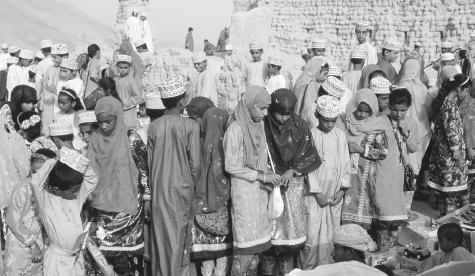Political Life Of Oman
Political Life

A crowded market in Fanja. The vast majority of the population outside of the capital area are engaged in subsistence agriculture, fishing, or animal husbandry.
Government:
Oman is a sultanate (a type of monarchy) with a sultan as the head of state and head of government. His position is hereditary within the Al Bu Sa'id family. There are few checks on the power of the sultan and his decrees form the basis of law. He appoints a council of ministers and can dismiss ministers without reason. There is no prime minister.
Leadership and Political Officials:
Senior members of the sultan's family routinely receive important government positions. More distant members of the family serve as ministers, other government officials, and the equivalent of governors throughout the country. Other ministers and senior government officials are chosen by merit and family or tribal connections; Muscat merchant families are overrepresented. There are no political parties and a limited electorate chooses candidates for the Majlis al-Shura, an indirectly elected consultative council dealing with social issues.
Social Problems and Control:
The legal system is derived from a combination of Western and Arab civil codes with the Shari'ah (Islamic law) used in family matters such as marriage and inheritance. The Royal Oman Police covers the entire country and is responsible for traffic, criminal investigation, firefighting, the coast guard, and immigration. Crime is infrequent although the capital area has seen a modest increase in burglaries and there is some drug and alcohol abuse. Civil disobedience is unknown and there is complete respect for the law and state institutions.
Military Activity:
The armed forces of Oman were created to counter several insurrections beginning in the 1950s. Since the mid-1970s, however, there has been no unrest in Oman and the security forces are geared to protect against potential external threats. Oman continues to maintain a relatively large military establishment in part to provide employment for its people.
Social Welfare and Change Programs
Social welfare is still basically a family and kin network business. The old, the handicapped, the disabled, and the disadvantaged are looked after by a network of relatives. Since the 1970s, the government has worked hard to establish a social welfare service to promote stability and security for families in a rapidly changing social environment. The Ministry of Social Affairs, Labor, and Vocational Training takes responsibility for making monthly payments to the elderly, the widowed, the divorced, and the disabled. Special attention has been given to training the mildly disabled, especially the young, through special government centers.
Nongovernmental Organizations and Other Organizations
Oman has very few nongovernmental organizations (NGOs). Perhaps as a reflection of security concerns, it remains very difficult to acquire formal government recognition of NGO status. The first NGO to be created in Oman in the 1970s, the Omani Women's Association, was integrated into the Ministry of Social Affairs and Labor in the early 1980s. The Association for the Welfare of Handicapped Children, which was founded in 1990, runs a number of centers for the care and rehabilitation of disabled children and has acquired a semiofficial status. The Oman Charitable Organization (also known as the Oman Benevolent Society), was created in the late 1990s by royal decree to provide assistance to the needy. Other NGOs include sports clubs, literary associations, and university cultural centers.
Gender Roles and Statuses
Division of Labor by Gender:
Gender roles are shaped by the demands of the economic realities of peoples' lives. In the desert interior of the country, women contribute very actively to economic activities associated with livestock raising and have significant social and political power. In the agricultural oasis settlements, the economic role of women is not as active and this is reflected in reduced social and political power. Women's roles in religion reflect the formal restrictions of Islam. In urban centers and towns, however, many women serve as teachers in Islamic pre-schools, the kuttaib.
The Relative Status of Women and Men:
Women have significant authority within the family unit and make strong contributions toward family decisions regarding various rites of passage. Outside the kin group, however, women have little authority or privilege. From the early 1990s, the government has made great efforts to include women in government. Women were nominated to run for election to the consultative council in 1997, with two obtaining seats, and several speeches of the sultan emphasized the importance of integrating women into public life.



Comments
Post a Comment